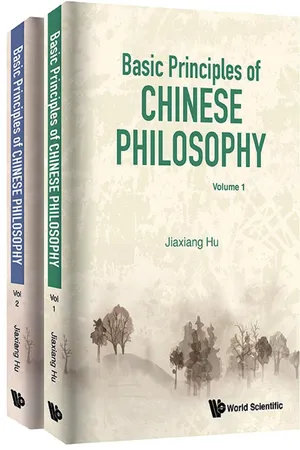
This is a test
- 684 pages
- English
- ePUB (mobile friendly)
- Available on iOS & Android
eBook - ePub
Book details
Book preview
Table of contents
Citations
About This Book
Among world's three major philosophic traditions, Chinese philosophy excels in ethical discourse. As a collective wisdom on a par with Aristotle's 'Ethics' and Kant's 'Critique of Practical Reason', Chinese philosophy now needs to be systematized and d
Frequently asked questions
At the moment all of our mobile-responsive ePub books are available to download via the app. Most of our PDFs are also available to download and we're working on making the final remaining ones downloadable now. Learn more here.
Both plans give you full access to the library and all of Perlego’s features. The only differences are the price and subscription period: With the annual plan you’ll save around 30% compared to 12 months on the monthly plan.
We are an online textbook subscription service, where you can get access to an entire online library for less than the price of a single book per month. With over 1 million books across 1000+ topics, we’ve got you covered! Learn more here.
Look out for the read-aloud symbol on your next book to see if you can listen to it. The read-aloud tool reads text aloud for you, highlighting the text as it is being read. You can pause it, speed it up and slow it down. Learn more here.
Yes, you can access Basic Principles of Chinese Philosophy by Jiaxiang Hu in PDF and/or ePUB format, as well as other popular books in Philosophy & Eastern Philosophy. We have over one million books available in our catalogue for you to explore.
Information
Publisher
WSPCISBN
9789813273900
Topic
PhilosophySubtopic
Eastern Philosophy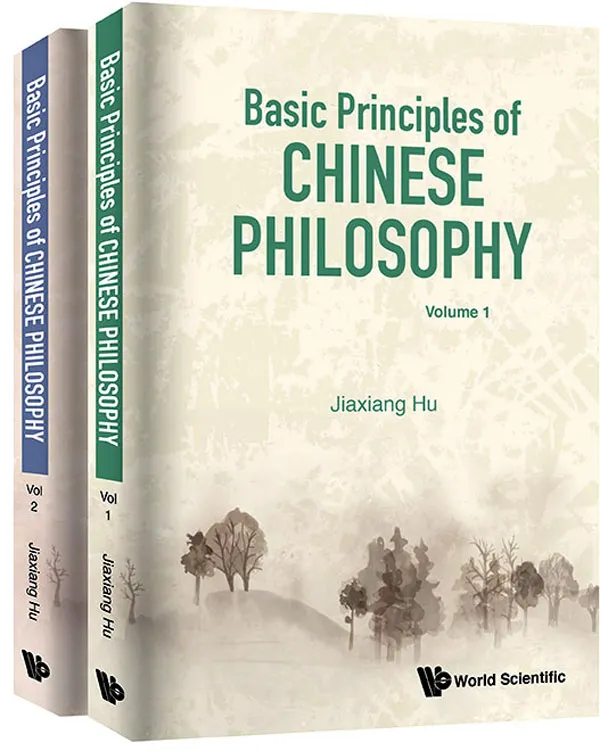
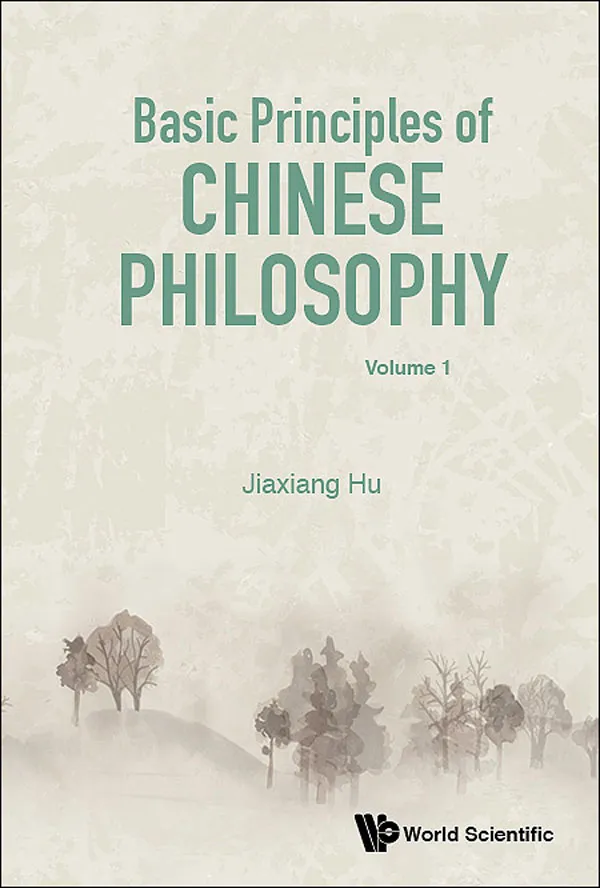
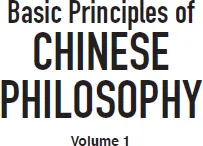
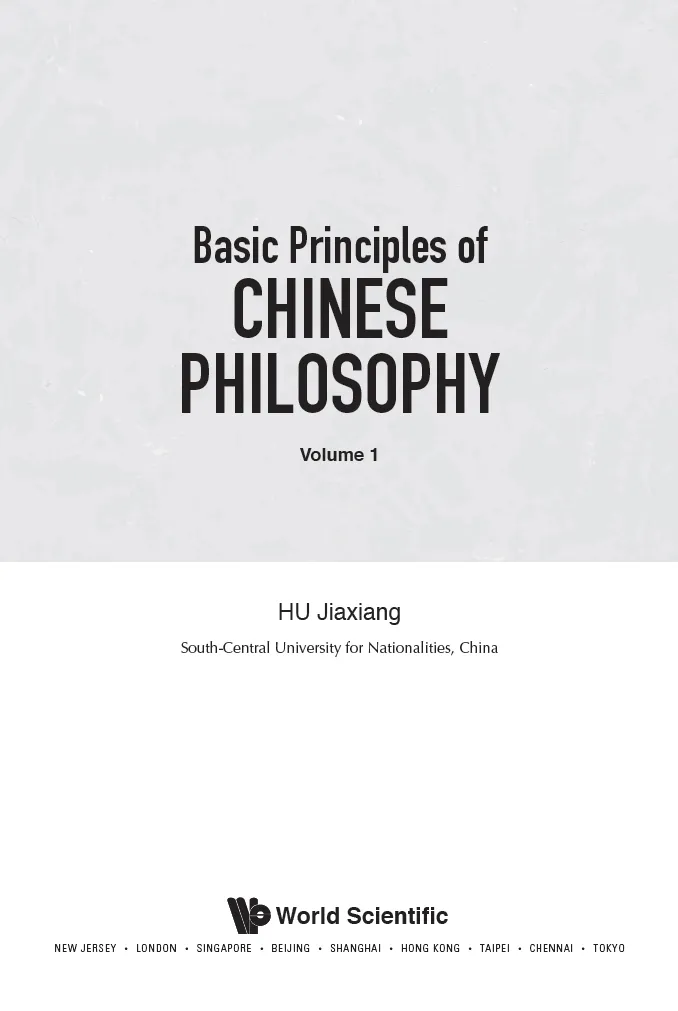
Published by
World Scientific Publishing Co. Pte. Ltd.
5 Toh Tuck Link, Singapore 596224
USA office: 27 Warren Street, Suite 401-402, Hackensack, NJ 07601
UK office: 57 Shelton Street, Covent Garden, London WC2H 9HE
Library of Congress Cataloging-in-Publication Data
Names: Hu, Jiaxiang, author.
Title: Basic principles of Chinese philosophy / by Jiaxiang Hu (South-Central University for Nationalities, China)
Description: New Jersey : World Scientific, [2018] | Includes bibliographic references.
Contents: Fundamental root of the cosmos -- Evolution of the cosmos -- The position of human kind -- The level of Zhixing -- The level of intellectuality -- The level of sensitivity -- Methodology -- Knowing and doing -- Spiritual realms of human life.
Identifiers: LCCN 2018043060| ISBN 9789813273887 (hc: set : alk. paper) | ISBN 9789813273948 (hc: v.1 : alk. paper) | ISBN 9789813273955 (hc: v.2 : alk. paper)
Subjects: LCSH: Philosophy, Chinese.
Classification: LCC B126 .H7758 2018 | DDC 181/.11--dc23
LC record available at https://lccn.loc.gov/2018043060
British Library Cataloguing-in-Publication Data
A catalogue record for this book is available from the British Library.
Copyright © 2019 by World Scientific Publishing Co. Pte. Ltd.
All rights reserved. This book, or parts thereof, may not be reproduced in any form or by any means, electronic or mechanical, including photocopying, recording or any information storage and retrieval system now known or to be invented, without written permission from the publisher.
For photocopying of material in this volume, please pay a copying fee through the Copyright Clearance Center, Inc., 222 Rosewood Drive, Danvers, MA 01923, USA. In this case permission to photocopy is not required from the publisher.
For any available supplementary material, please visit
https://www.worldscientific.com/worldscibooks/10.1142/11088#t=suppl
Desk Editors: Herbert Moses/Lixi Dong
Typeset by Stallion Press
Email: [email protected]
Printed in Singapore
Foreword
Chinese philosophy, as a great nation’s gem of wisdom, commits itself to the exploration of the mystery in the cosmos and human life, which is its eternal theme. Over the past millenniums, Chinese philosophy has kept renewing itself with great vitality. It is a philosophy that has developed in history and taken in a great variety of contents in history to meet people’s spiritual demands. After entering the modern epoch, we are facing such pressing questions as whether it is possible to construct modern Chinese philosophy and how to construct it if it is possible. Professor Hu Jiaxiang’s 胡家祥 Preliminary Discussion on the Basic Principles of Chinese Philosophy 中國哲學原理初編 is an important accomplishment in this regard in answer to these questions.
With the word “basic principles” in its title, the book aims to find out, and thereby systemize the exposition of, such implications of considerable universality that have been intrinsic and fundamental to Chinese philosophy. In other words, it aims to reveal in modern language the latent as well as the well-established systems that are inherent to, but not yet explicitly formulated in, Chinese philosophy. Its idea is to nourish the spiritual civilization of our contemporary time with the essence and universal values in philosophy. Moreover, the book is entitled basic principles of “Chinese philosophy” because the project integrates the thoughts of Confucianism, Daoism, and Buddhism in China, and thereby reveals the seemingly conflicting principles they actually share in common. With this method, one is able to see both an entire forest and the individual trees therein. As for the phrase “preliminary discussion” in the title, it is used to indicate that although this exceedingly difficult task has been “completed”, it is subject to revision and further substantiation. Reflected in the phrase is, therefore, not only the author’s modesty but also a conscientious and sincere work attitude.1
Since the end of the period between 1930s and 1940s, Chinese philosophers have been using new perspectives and new methods in their interpretations of Chinese philosophy, thereby making remarkable contributions to the modernization of philosophy. But they mostly confined themselves within the mode of “interpreting the Chinese from Western perspectives”. Now we have entered an age of cultural diversity, an age that witnesses an even higher status of Chinese philosophy than before and the further awakening of the cultural self-consciousness in China. What role should Chinese philosophy play in such a modern society? To answer this question, one would need to proceed from where our predecessors have left off. We should, on the one hand, reach the depths of Chinese philosophy and, through our life experience, grasp the essence of its spirit. On the other hand, we need to come up with new interpretations through our original theoretical approach. Only by “submerging into it” can one “come out of it”. This is exactly what Professor Hu has done. He spent over ten years assimilating the scholarship of the past while drawing materials from the scholarships that are up-to-date. And he did so with a view to merging Chinese philosophy into the modern society, reaching its depths and extracting its key points so as to obtain the essence that is most valuable to people today. His approach is original and yet without losing sight of the main spirit of Chinese philosophy, his logic is rigorous without deviating from the basics of Chinese philosophy, and his standpoint is based in the modern world and yet related to both the ancient and the present, thereby retaining the vitality of Chinese philosophy. The book is at once its author’s summary of, and his creative contribution to, the development of the modernization of Chinese philosophy.
Professor Hu structured the book on the basis of an important view. He thinks that Chinese philosophy can be called the study of humankind, because the philosophy addresses issues of the cosmos and human life with its particular emphasis laid on human life, specially, on humankind’s status in the cosmos as well as the meaning and value of the status. Central to this study of humankind, as he argues, is the study of heart-nature 心性, which he refers to as the philosophy of the heart in its broad sense. In the study of heart-nature, he accords particular attention and importance to the status and function of “Zhi” 志 (“free will”; “ideal”; “purpose”; “aspiration”), arguing that “Zhi is where the value of human life resides”, “Zhi features a combination of ideal and free will”, and “Zhi is … the leader of all elements of heart-nature”. Given the important status of Zhi in Chinese philosophy as we know, none has elevated the status and emphasized the function of Zhi as much in history. His inference of such implications from Chinese philosophy should be considered as a new development in contemporary scholarship. By emphasizing Zhi and elevating its status, he means to highlight a vigorous and robust spirit in Chinese philosophy and promote the perfection of a personality that keeps striving for the better.
In addition to connecting the ancient and the present, the author of the book also makes an effort to integrate the Chinese and the Western thoughts. Particularly, there are numerous splendid observations made in the book to underscore the characteristics of Chinese philosophy and its unique contributions to the modern society. He observes, for example, that “[m]uch as Chinese philosophy always centralizes human kind, it fundamentally differs from Western anthropocentrism”. No one can raise this point without having conducted enough in-depth research in this regard. As another example, in his explication of “emotion”, the author suggests that emotions are not only “the blood vessels of humanistic culture”, they can also be marked by “noble” feelings related to value issues, which, as a feature, explains the strengths of Chinese philosophy in ethics and aesthetics. This is also a very incisive remark. As one more example, the author, when explaining the term “身體” shenti (meaning “body” in modern Chinese), points out that the term speaks of a theory of praxis and cognitive experience that makes a point of “experiencing or embodying something in person”. It is, according to him, a theory that treats the body and mind as a unity instead of a duality. This is indeed an observation that proceeds from a profound understanding of Chinese philosophy. In this book, there are in fact a lot more observations of this kind than we must cite in a preface.
Professor Hu gave this book’s manuscript to me for my advice and asked me to write a preface. I find it to be an exceptionally good book after reading it, hence my incomprehensive evaluation of it in the above, by which means I wish to share this book with many more scholars and students so that all can learn something new from it.
Meng Peiyuan 蒙培元
2nd January, 2012
2nd January, 2012
__________________
1The book was originally entitled Preliminary Discussion on the Basic Principles of Chinese Philosophy. During the nearly yearlong consultation for advice and revision, there were colleague scholars who suggested removing the phrase “preliminary discussion” on the grounds that, in liberal arts and social sciences, the use of the phrase “basic principles” did not imply that the principles dealt with in a scholarly undertaking were exclusively all the principles. Their advice is adopted, hence the present title of the book.
Preface
This book, written under the inspiration of Mr. Zhang Dainian’s Key Concepts in Chinese Philosophy, is aimed at revealing the intrinsic relationship between some basic categories and propositions. And, relative to Mr. Zhang’s work, the book takes a further step to promote the systematization of Chinese philosophical discourses by drawing on materials from Kantian mode of thinking.
Specifically, it attempts to identify and explicate both the fundamental principles along which major thoughts and frameworks in Chinese philosophical heritage were constructed, and their value and implications to contemporary China and the world. Key categories examined include, inter alia, Zhi (i.e. free will and ideal), benevolence, righteousness, rite, the Way of Heaven, and such key notions as Qian and Kun in the Book of Changes. Where the categories are concerned, particular attention is accorded to their sources, meanings, relations, and — especially — the principles underlying both their interrelations and the roles they have played in the construction of the thoughts and frameworks in the said cultural heritage. It is the author’s hope that the book may contribute its part in human search for — to borrow Maslow’s word — the “resacralizeation” of life and thereby promote the spiritual civilization in the contemporary world.
About the Author

About the Translator

Table of contents
- Basic Principles of Chinese Philosophy